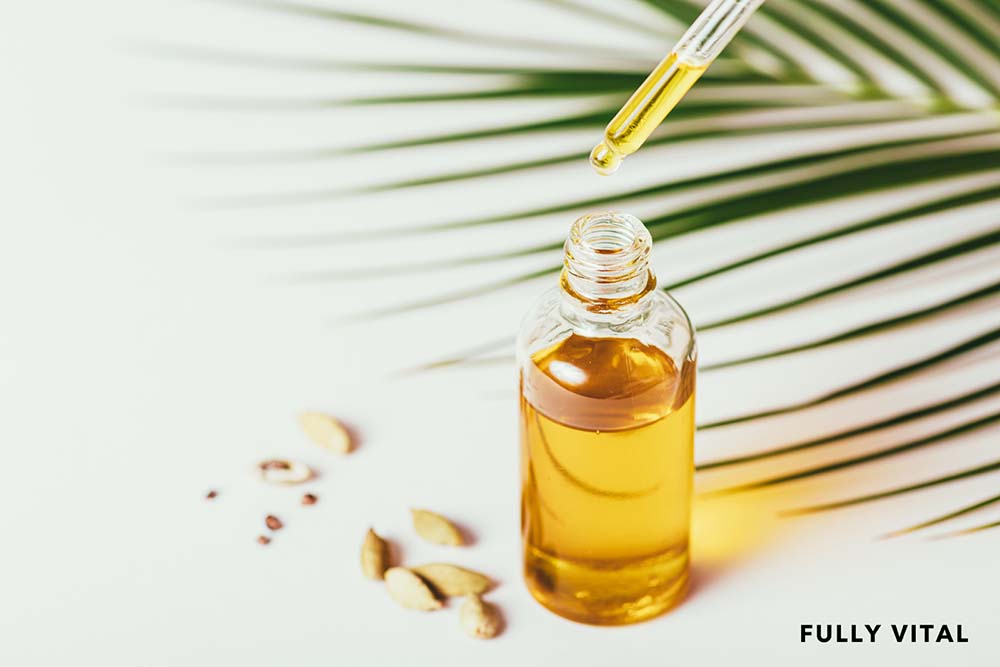
Vitamin A: Unlocking The Secrets To Healthy Hair Growth
Welcome to our comprehensive guide on vitamin A, an essential nutrient that plays a crucial role in stimulating hair growth.
Whether you're looking to enhance the health and vitality of your hair or combat hair loss, understanding the benefits and workings of vitamin A is essential.
In this article, we'll delve into the importance of vitamin A, how it works, its benefits, potential downsides, and even explore alternative options. So, let's get started!

I LOVE MY HAIR NOW
FullyVital hair serum and hair vitamins made tremendous improvements in my hair. I truly love my hair now.
Dorit S.,
What Is Vitamin A?
Vitamin A is a fat-soluble vitamin that is naturally present in various foods.
It belongs to the group of retinoids, which includes retinol, retinal, and retinyl esters.
These compounds are essential for maintaining healthy vision, supporting the immune system, and promoting proper cell growth throughout the body.

Why Is Vitamin A Important?
Vitamin A is particularly important for hair growth as it helps in the production of sebum, the natural oil produced by the scalp.
Sebum moisturizes the scalp, keeping the hair follicles healthy and promoting hair growth.
Additionally, vitamin A supports the development of tissues and cells throughout the body, including the hair follicles.(1)
How Does Vitamin A Work?
Vitamin A acts as a catalyst for various biological processes that are essential for hair growth.
Firstly, it stimulates the production of retinoic acid, which binds to specific receptors in the hair follicles, promoting hair growth and preventing hair loss.
Moreover, vitamin A also enhances the absorption and utilization of other key nutrients required for healthy hair, such as protein and iron
What Are The Benefits Of Vitamin A?
The benefits of vitamin A extend beyond hair growth. Here are some additional advantages of incorporating vitamin A into your diet:
Promotes scalp health
By supporting the production of sebum, vitamin A keeps the scalp moisturized and prevents dryness, itchiness, and dandruff.(2)
Enhances hair strength
Vitamin A aids in the production of collagen, a protein that strengthens the hair shaft and reduces breakage.
Supports overall hair health
Proper vitamin A intake ensures that your hair remains shiny, lustrous, and less prone to damage.
Boosts immune function
Vitamin A plays a vital role in strengthening the immune system, which indirectly contributes to healthy hair growth.
Are There Any Downsides To Vitamin A?
While vitamin A is beneficial for hair growth, it's important to note that excessive intake can have adverse effects.
Consuming too much vitamin A, either through supplements or high-dose sources, may lead to a condition called hypervitaminosis A.
Symptoms of hypervitaminosis A include hair loss, dry skin, nausea, headache, and even liver damage.
Therefore, it is crucial to maintain a balanced intake of vitamin A within the recommended daily limits.
What Are The Alternatives To Vitamin A?
If you're unable to incorporate vitamin A into your diet or prefer alternative options, there are other nutrients that can contribute to healthy hair growth. Consider the following alternatives:
Biotin (Vitamin B7)
Biotin helps strengthen the hair shaft and improve hair growth.
It is found in foods like eggs, nuts, and salmon.
Vitamin C
This antioxidant vitamin promotes collagen production, which aids in hair strength and growth.
Citrus fruits, strawberries, and bell peppers are excellent sources of vitamin C.
Iron
Iron deficiency can lead to hair loss. Consume iron-rich foods such as lean meats, spinach, and lentils to maintain healthy hair.
Omega-3 Fatty Acids
Found in fish, flaxseeds, and walnuts, omega-3 fatty acids help nourish the scalp and promote hair growth.
Is Vitamin A Safe Every Day?
Yes, vitamin A is safe to consume every day, as long as you adhere to the recommended daily intake guidelines.
The recommended dietary allowance (RDA) for vitamin A varies depending on age, sex, and life stage. For most adults, the RDA ranges from 700 to 900 micrograms of retinol activity equivalents (RAE) per day.
It's important to note that excessive intake of vitamin A can have adverse effects, so it's crucial to stay within the recommended limits.
When Should I Take My Vitamin A?
You can incorporate vitamin A into your daily routine by consuming foods rich in this nutrient or by taking vitamin A supplements.
It's generally recommended to take vitamin A with a meal or snack that contains some dietary fat.
This allows for better absorption of the fat-soluble vitamin. However, it's always advisable to follow the specific instructions provided on the supplement packaging or consult with a healthcare professional for personalized guidance.
Which Foods Are High In Vitamin A?
There are numerous food sources that provide vitamin A.
Here are some examples of foods rich in this essential nutrient:
Animal sources
Liver, fish oil, beef, chicken, and eggs are excellent sources of vitamin A.
Orange and yellow fruits and vegetables
Carrots, sweet potatoes, apricots, mangos, and cantaloupes are rich in beta-carotene, a precursor to vitamin A.
Leafy green vegetables
Spinach, kale, and collard greens are packed with vitamin A.
Dairy products
Milk, cheese, and yogurt are fortified with vitamin A.
Fortified foods
Many breakfast cereals, margarines, and plant-based milk alternatives are fortified with vitamin A.
Is Vitamin A Good For Your Eyes?
Absolutely! Vitamin A is crucial for maintaining good eye health.
It plays a vital role in the formation of a light-sensitive molecule called rhodopsin, which is found in the retina of the eye.
Rhodopsin is essential for vision in low-light conditions.
Adequate vitamin A intake is also associated with a reduced risk of age-related macular degeneration, a common cause of vision loss in older adults.
What Is The History Of Vitamin A?
The history of vitamin A is rooted in scientific discoveries and advancements in understanding human nutrition. Here are some key points about the history of vitamin A:(3)
Discovery of retinol
In the early 20th century, scientists recognized that consuming certain foods prevented and treated night blindness.
This led to the identification of retinol, a form of vitamin A, as the key nutrient responsible for maintaining healthy vision.
Identification of other retinoids
Over time, researchers discovered other retinoids, including retinal and retinyl esters, expanding the understanding of the various forms and functions of vitamin A in the body.
Role in skin health and hair growth
As research progressed, the importance of vitamin A in maintaining healthy skin and supporting hair growth became evident.
This knowledge laid the foundation for exploring the potential applications of vitamin A in hair growth products.
Understanding the history of vitamin A provides valuable insights into the significance of this nutrient in the context of hair growth and overall health.
What Is The Current Environment Of Vitamin A?
In today's world, vitamin A continues to be a widely recognized and studied nutrient with numerous applications.
Here's an overview of the current environment surrounding vitamin A:
Scientific research
Ongoing scientific studies are further uncovering the mechanisms of action and potential benefits of vitamin A in hair growth and overall health.
Researchers are exploring the interplay between vitamin A and other nutrients, as well as its interaction with genetic factors and hormonal influences.
Hair growth industry
The hair growth industry recognizes the importance of vitamin A as a key ingredient in various products.
Hair care products, including shampoos, conditioners, and serums, often feature vitamin A or its derivatives due to their potential benefits for hair health and growth.
Consumer awareness
With the growing emphasis on natural and holistic approaches to hair care, consumers are becoming increasingly aware of the role of essential nutrients like vitamin A in maintaining healthy hair.
The demand for hair growth products that incorporate vitamin A as a prominent ingredient is on the rise.
The current environment surrounding vitamin A reflects a combination of scientific advancements, industry trends, and increased consumer awareness of the importance of this nutrient for hair growth.
What Is The Future Of Vitamin A?
As research and innovation continue to shape the field of nutrition and hair care, the future of vitamin A holds promising possibilities. Here are some aspects to consider:
Further scientific discoveries
Ongoing research may uncover additional functions and benefits of vitamin A, shedding light on its full potential for hair growth and overall well-being.
Formulation advancements
Continued advancements in formulation techniques may lead to the development of more effective and targeted delivery systems for vitamin A, maximizing its benefits for hair health.
Personalized approaches
With the advancement of personalized nutrition and tailored hair care solutions, vitamin A may be incorporated into individualized regimens based on specific hair types, needs, and genetic factors.
Sustainability considerations
As the world focuses on sustainability, the future of vitamin A may involve exploring eco-friendly and ethically sourced alternatives to traditional sources of this nutrient.
Unlock the Secrets to Youthful Hair with Fully Vital!Experience the transformational power of our science-backed hair growth products designed to stop the aging of your hair. At Fully Vital, we understand the importance of maintaining a healthy relationship with your locks. That's why we've crafted a variety of innovative solutions to help you embrace vibrant, youthful-looking hair. Key Features and Benefits
|
Final Thoughts On Vitamin A
Vitamin A is an indispensable nutrient when it comes to promoting healthy hair growth.
By understanding its importance, benefits, and role in maintaining hair health, you can make informed decisions to support the vitality of your locks.
Whether you're looking to stimulate hair growth, combat hair loss, or enhance overall hair health, incorporating vitamin A into your routine can make a noticeable difference.
At Fully Vital, we are committed to helping you nurture a healthy relationship with your hair.
Our range of hair growth products is designed to stop the aging of your hair, providing the nourishment and support it needs to thrive.
We believe that by harnessing the power of essential nutrients like vitamin A, you can achieve the vibrant, luscious locks you desire.
Frequently Asked Questions About Vitamin A
Can vitamin A alone treat hair loss?
No, while vitamin A is essential for hair growth, it cannot single-handedly treat hair loss.
Hair loss can have various causes, including genetics, hormonal imbalances, and medical conditions.
It's important to consult a healthcare professional for a proper diagnosis and personalized treatment plan.
How can I incorporate more vitamin A into my diet?
You can increase your vitamin A intake by consuming foods such as carrots, sweet potatoes, spinach, kale, eggs, and liver.
Alternatively, you can opt for vitamin A supplements under the guidance of a healthcare professional.
Is it safe to take vitamin A supplements?
While vitamin A supplements can be beneficial, it's important to follow the recommended dosage.
Excessive intake can lead to hypervitaminosis A, as mentioned earlier. Consult with a healthcare professional before starting any new supplements.
Can vitamin A promote hair growth in menopausal women?
Yes, vitamin A can support hair growth in menopausal women.
Hormonal changes during menopause can affect hair health, and vitamin A, along with other nutrients, can help maintain healthy hair growth during this phase.
What happens when you have too much vitamin A?
Excessive intake of vitamin A can lead to a condition called hypervitaminosis A. Here are some potential effects of consuming too much vitamin A:
-
Hair loss: Excessive vitamin A intake can cause hair loss or thinning.
-
Dry and itchy skin: High levels of vitamin A may lead to dryness, itchiness, and peeling of the skin.
-
Nausea and vomiting: In some cases, excessive vitamin A can cause nausea, vomiting, and gastrointestinal discomfort.
-
Headache and dizziness: High doses of vitamin A may result in headaches, dizziness, and even blurred vision.
- Liver damage: Prolonged excessive intake of vitamin A can lead to liver damage, particularly when consumed in the form of supplements.
It's important to stay within the recommended daily limits of vitamin A to avoid these potential adverse effects.
What causes vitamin A deficiency?
Vitamin A deficiency can occur due to several factors, including:
-
Inadequate dietary intake: Not consuming enough vitamin A-rich foods, such as fruits, vegetables, and animal products, can lead to deficiency.
-
Malabsorption issues: Certain medical conditions, such as celiac disease, Crohn's disease, and cystic fibrosis, can impair the absorption of vitamin A from the diet.
-
Alcoholism: Chronic alcohol abuse can interfere with the absorption and utilization of vitamin A.
- Fat malabsorption: Conditions that affect fat absorption, such as pancreatic disorders or gallbladder issues, can impair the absorption of fat-soluble vitamins like vitamin A.
Vitamin A deficiency can have serious health consequences, including impaired vision, weakened immune function, and growth abnormalities.
What happens if you don't get enough vitamin A?
Insufficient vitamin A intake can result in various health issues, including:
-
Night blindness: One of the earliest signs of vitamin A deficiency is difficulty seeing in low-light conditions or at night.
-
Dry and rough skin: Vitamin A deficiency can cause dryness, roughness, and flakiness of the skin.
-
Increased susceptibility to infections: Vitamin A plays a crucial role in maintaining a robust immune system. Inadequate intake can weaken immune function and make individuals more prone to infections.
-
Delayed growth and development: Children with vitamin A deficiency may experience stunted growth and delayed development.
- Impaired reproductive function: Inadequate vitamin A can affect reproductive health and fertility in both men and women.
To prevent these complications, it's essential to ensure a sufficient intake of vitamin A through a balanced diet or supplementation if necessary.
How many times should you take vitamins a day?
The frequency of vitamin A intake depends on the form in which you are consuming it:
-
Dietary intake: If you're obtaining vitamin A from food sources, it's recommended to incorporate it into your meals or snacks throughout the day.
Consuming a balanced diet with vitamin A-rich foods can help meet your daily requirements.
-
Supplements: For vitamin A supplements, it's generally advised to follow the instructions provided on the product packaging or consult with a healthcare professional.
Some supplements may require a single daily dose, while others may recommend splitting the dosage into multiple servings.
Always consult with a healthcare professional or a registered dietitian for personalized guidance on the appropriate frequency of vitamin A intake based on your specific needs.
How long is vitamin A good for?
The shelf life of vitamin A supplements can vary depending on the formulation and storage conditions.
It's crucial to check the expiration date provided on the supplement packaging. Generally, vitamin A supplements can remain effective and safe for consumption until the expiration date if stored properly in a cool, dry place, away from direct sunlight.
Sources:
- VanBuren, C. A., & Everts, H. B. (2022). Vitamin A in Skin and Hair: An Update. Nutrients, 14(14), 2952. https://doi.org/10.3390/nu14142952
- Harvard School of Public Health. (2019, July 2). Vitamin A. The Nutrition Source. https://www.hsph.harvard.edu/nutritionsource/vitamin-a/
- Semba, R. D. (2012). On the “discovery” of vitamin A. Annals of Nutrition & Metabolism, 61(3), 192–198. https://doi.org/10.1159/000343124







